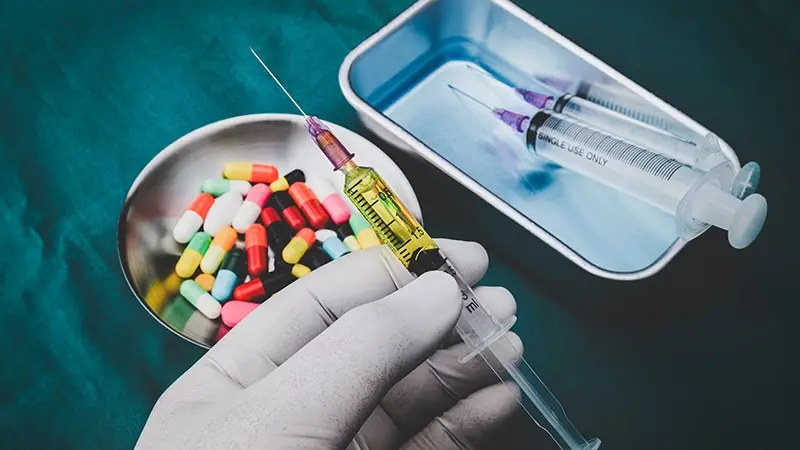Steroids, a class of compounds including both naturally occurring corticosteroids and anabolic steroids, have diverse effects on various body systems. One significant impact of steroid use—particularly long-term or high-dose regimens—is on insulin sensitivity, which refers to how responsive body cells are to the hormone insulin. Insulin sensitivity is crucial for maintaining blood glucose levels within a healthy range, as insulin helps cells absorb glucose from the bloodstream for energy or storage.
While steroids can be lifesaving and enhance quality of life for individuals with certain medical conditions, their influence on metabolic processes cannot be overlooked. Specifically, steroids can alter the body’s normal response to insulin, potentially leading to a condition known as steroid-induced diabetes. This form of diabetes arises because muscle, fat, and liver cells become less responsive to insulin, requiring higher amounts of this hormone to absorb glucose.
Quick Summary
- Steroids can negatively affect insulin sensitivity, potentially leading to increased blood glucose levels.
- Unmanaged steroid use may result in steroid-induced diabetes due to altered insulin response.
- Proper management of insulin resistance during steroid therapy is essential to prevent further complications.
The Role of Steroids and Insulin Sensitivity

Steroids can significantly impact insulin sensitivity, potentially leading to altered glucose regulation. Different steroids have varying effects on how the body manages insulin and glucose levels.
Biological Mechanisms
Steroids, particularly glucocorticoids such as cortisol and synthetic versions like dexamethasone and hydrocortisone, influence insulin sensitivity through several biological pathways. These hormones can reduce the uptake of glucose into muscle and adipose tissue cells by interfering with the signaling pathways of insulin, leading to insulin resistance. Glucocorticoids can increase the production of glucose in the liver, a process known as gluconeogenesis, further contributing to elevated blood glucose levels, or hyperglycemia.
Effects on Insulin Signaling:
- Reduction in cell surface insulin receptors: Steroids may decrease the number of insulin receptors available on the cell surface.
- Impairment of insulin receptor signaling: Can attenuate the effect of insulin on its target tissues, mainly muscle and adipose tissue.
Influence on Glucose Production:
- Increased gluconeogenesis: Enhancing hepatic glucose output.
- Decreased glycogen synthesis: Reducing glucose storage in the liver.
Types of Steroids and Their Effects on Glucose Regulation
Steroids can be classified into corticosteroids and anabolic steroids, both of which have different implications for glucose regulation. Corticosteroids like cortisone and prednisone mimic natural cortisol’s effects and can induce insulin resistance and hyperglycemia. In contrast, anabolic steroids used for muscle building can also influence insulin sensitivity, but this remains a complex field with a mix of potential effects on glucose metabolism.
Corticosteroids:
- Cortisol: Elevates blood sugar levels through insulin resistance.
- Dexamethasone and Hydrocortisone: Potent glucocorticoids that can induce hyperglycemia by increasing hepatic glucose output and decreasing peripheral glucose uptake.
Anabolic Steroids:
- Variable effects on insulin sensitivity: Some studies suggest they can improve glucose utilization; in contradiction, others report an increased risk of insulin resistance.
References
- Gupta V, Lee M. Glucocorticoid-induced insulin resistance: How to diagnose it and potential management strategies. Diabetes Metab Res Rev. 2020;36(S1). https://doi.org/10.1002/dmrr.3282
- Lamberts SW, Bruining HA, de Jong FH. Corticosteroid therapy in severe illness. N Engl J Med. 1997;337(18):1285-92. https://www.nejm.org/doi/full/10.1056/NEJM199710303371807
- Saad F, Aversa A, Isidori AM, Zafalon L, Zitzmann M, Gooren L. Onset of effects of testosterone treatment and time span until maximum effects are achieved. Eur J Endocrinol. 2011;165(5):675-85. https://doi.org/10.1530/EJE-11-0221
Impact of Steroids on Blood Glucose and Insulin Secretion

Steroids can significantly affect blood glucose levels and alter the body’s insulin secretion patterns, which may lead to dysregulation in individuals, especially those with pre-existing conditions such as diabetes.
Acute and Chronic Influence on Blood Glucose Levels
Acute steroid use can cause a temporary increase in blood glucose levels. The liver reacts by releasing more glucose into the bloodstream, elevating both fasting and postprandial blood glucose levels. In contrast, with chronic administration, the body’s cells may become resistant to insulin, leading to consistently high blood glucose levels that can complicate glucose control strategies.
- Fasting Blood Glucose: Increase observed after acute and chronic steroid use.
- Postprandial Blood Glucose: Acute use can spike levels; chronic use complicates control.
A1C levels, also known as HbA1c, which reflect average blood glucose levels over several months, can rise as a result of prolonged steroid use, indicating poor blood glucose management.
Adverse Effects on Insulin Secretion and Function
Steroids can interfere with the normal function of insulin, often diminishing its effectiveness in controlling blood sugar levels. This effect can lead to the development of steroid-induced diabetes, particularly in individuals with no previous history of the disease. In those already managing diabetes, steroids can make insulin therapy more complex and necessitate regular adjustments.
- Insulin Secretion: May decrease with steroid use, worsening control.
- Cells’ Response to Insulin: Steroids can increase resistance, necessitating higher insulin doses.
Further complications include an increased need for glucose monitoring to manage the side effects of altered insulin function and to ensure that blood glucose levels are kept within a healthy range. Steroid use may also contribute to an accumulation of visceral fat, exacerbating insulin resistance.
References
- “Steroid-induced hyperglycemia: An underdiagnosed problem or clinical inertia? A narrative review.” (https://www.sciencedirect.com/science/article/abs/pii/S2213858717303613)
- “Glucocorticoids and insulin resistance: old hormones, new targets.” (https://link.springer.com/article/10.1007/s001250051425)
- “The effect of glucocorticoids on pancreatic islet A-cell function.” (https://journals.sagepub.com/doi/abs/10.1177/14791641103662680)
Diagnosis and Treatment of Steroid-Induced Diabetes

Steroid-induced diabetes is a form of diabetes mellitus that occurs due to the use of glucocorticoids which are known to impair insulin sensitivity. Diagnosis involves specific criteria and the treatment mandates a careful selection of therapeutic strategies to manage elevated glucose levels.
Identification and Diagnostic Criteria
The diagnosis of steroid-induced diabetes should be considered in patients who exhibit hyperglycemia following steroid therapy. A high degree of suspicion is necessary in those with risk factors such as obesity, a family history of diabetes, presence of metabolic syndrome, and high body mass index (BMI). The American Diabetes Association (ADA) recommends testing for diabetes in patients taking steroids who have risk factors or if they are presenting with symptoms of hyperglycemia.
The oral glucose tolerance test (OGTT) is an essential diagnostic tool. Diagnostic criteria follow the guidelines for the diagnosis of diabetes and include a fasting plasma glucose level ≥126 mg/dL (7.0 mmol/L) or an OGTT 2-hour plasma glucose level ≥200 mg/dL (11.1 mmol/L) on more than one occasion.
Therapeutic Strategies and Medications
Upon diagnosis, therapeutic strategies should aim to achieve optimal glucose control and minimize the risk of diabetes complications. Initially, lifestyle modifications including diet and exercise are recommended. If lifestyle changes are insufficient, medication may be necessary. The first-line pharmacotherapy in most cases is metformin, which improves insulin sensitivity and has a low risk of causing hypoglycemia.
Patients with steroid-induced diabetes might require insulin therapy to control hyperglycemia if oral medications are not enough. The insulin regimen is adjusted according to glucose monitoring results. Since the glucocorticoid effect on blood glucose is often greatest in the postprandial period, short-acting insulins may be preferred.
References
American Diabetes Association. (n.d.). Standards of Medical Care in Diabetes—2020. Diabetes Care. Retrieved from https://diabetesjournals.org/care/article/43/Supplement_1/S1/30380/Introduction-Standards-of-Medical-Care-in-Diabetes
Management of Insulin Resistance in Steroid Therapy

Effective management of insulin resistance during steroid therapy, such as in glucocorticoid-induced diabetes, is critical in reducing associated morbidities, including cardiovascular diseases and infections. Patients often require adjustments in insulin dosage and lifestyle modifications to maintain glucose control and minimize the risk of complications like prolonged hospital stays and adrenal suppression.
Monitoring and Adjusting Insulin Dosage
Regular Blood Glucose Monitoring: Patients on steroid therapy should have their blood glucose levels checked frequently to detect insulin resistance early. This is particularly important for patients undergoing renal transplant or receiving high-dose prednisone.
- Adjust Insulin Dosage: If insulin resistance is detected, clinicians need to adjust the insulin dosage accordingly. This may involve:
- Increasing the dosage of insulin.
- Altering the timing of insulin administration.
- Introducing additional insulin types, if necessary.
Hospital Settings: In the case of hospital admissions, clinicians should closely monitor patients’ insulin levels due to the elevated risk of hyperglycemia and adjust dosages as needed.
Lifestyle Modifications and Supportive Care
Diet and Exercise: Patients should be supported to adopt a diet low in simple carbohydrates and rich in vegetables, lean proteins, and whole grains. Regular exercise should be encouraged to improve insulin sensitivity and reduce skeletal muscle insulin resistance.
- Weight Management: Effective strategies to prevent weight gain—common with chronic steroid use—can play a significant role in managing insulin resistance.
Lipid Profile Management: Control of blood cholesterol and triglycerides through diet, exercise, and medications is important to reduce the risk of cardiovascular disease.
Preventative Care:
- Patients should be educated on the potential for increased infections due to steroid therapy and advised on measures to reduce this risk.
- Regular screenings and medical support can help detect and manage complications early.
References
Preventing Complications and Comorbidities

Steroids can significantly impact insulin sensitivity, leading to a greater risk of various complications. Effective management strategies are crucial in mitigating these risks.
Addressing Cardiovascular and Lipid Disorders
Steroids may contribute to dyslipidaemia and altered lipid metabolism, increasing cardiovascular risk. A primary strategy is blood glucose monitoring to maintain glucose control and lower the chance of lipid disorders. Implementing therapeutic recommendations that include tailored physical activity programs and dietary modifications is vital. In patients with a family history of cardiovascular diseases or those who are obese, vigilant management of blood glucose levels and routine lipid profiles are important to prevent hypertension and atherosclerosis.
- Blood Glucose: Regular monitoring with adjustments in therapy as needed.
- Lipid Profile: Periodic testing, with statins considered for those with significant dyslipidaemia.
- Lifestyle: Encouraging a heart-healthy diet and regular, moderate-intensity exercise.
Reducing the Risk of Microvascular and Macrovascular Diseases
Long-term steroid use can lead to high blood glucose, affecting microvascular and macrovascular systems. A comprehensive approach for reducing risk involves intensive glucose control and frequent consultations to adjust medications. Patients with comorbid conditions such as COPD or asthma may require additional monitoring to manage the risk of exacerbation. Maintaining bone density is essential too, as steroids can cause osteoporosis. For individuals prone to diseases like lupus, treatments should be carefully balanced to avoid triggering flares.
- Microvascular Health: Control of blood glucose to prevent retinopathy, neuropathy, and nephropathy.
- Bone Health: Monitoring and therapy for preventing osteoporosis caused by long-term steroid use.
- Chronic Conditions: Adjusting treatments for comorbid conditions to avoid worsening of microvascular or macrovascular states.
References
Understanding Population Dynamics and Epidemiology

The following section examines the effects of steroids on insulin sensitivity within various demographics and the global epidemiological trends, providing insights for healthcare professionals.
Impact of Steroid Use in Specific Groups
Steroids impact insulin sensitivity differently across various populations. The prevalence of complications arising from steroid use is particularly higher in individuals with obesity and Type 2 diabetes. These groups display increased resistance to insulin due to factors such as high adipose tissue volume that exacerbates the already existing condition. Research indicates that the common usage of steroids in these populations leads to a more pronounced reduction in insulin sensitivity, thereby increasing the risk for developing diabetes or worsening glycemic control in those with existing conditions.
- Risk Factors:
- Obesity: High BMI and adipose tissue volume
- Metabolic Syndrome: Pre-diabetes symptoms and impaired glucose tolerance
- Family History: Genetic predisposition to insulin resistance
- A1C Levels: Indicator of poor glycemic control over time
Global Trends and Healthcare Guidance
The global trends suggest a rise in the prevalence of steroid-induced alterations in glucose metabolism, likely linked to an increase in metabolic syndrome and the incidence of chronic conditions like obesity and Type 2 diabetes. The international healthcare community has been forced to reassess clinical guidelines to account for the enhanced risk factors. It has become essential to consider the following in healthcare guidance:
- Prevalence: Global data projects increased incidence of steroid-induced glucose intolerance.
- Body Mass Index (BMI): As an indicator of obesity, a higher BMI is a common predictor of insulin resistance.
- Mortality: There is a potential increase in mortality related to steroid usage in vulnerable populations, particularly those with the aforementioned risk factors.
Healthcare professionals are encouraged to monitor patients on steroids closely, specifically measuring A1C and BMI, to manage and mitigate these risks effectively.
Frequently Asked Questions

When discussing steroids and insulin sensitivity, it’s essential to understand how steroid therapy affects blood sugar and what steps can be taken to mitigate these effects.
How can blood sugar be managed effectively while undergoing steroid therapy?
Individuals can manage their blood sugar through regular monitoring and adjustments in their diet and exercise regimen. Health professionals often emphasize the need for a balanced diet with controlled carbohydrate intake and regular physical activity to stabilize blood sugar levels.
What adjustments are necessary for insulin dosing when taking prednisone?
Taking prednisone may require an increase in insulin dosage for individuals with diabetes. The exact adjustment should be determined by regular glucose monitoring and consultations with a healthcare provider to prevent hyperglycemic episodes.
Are there methods to mitigate the impact of steroids on blood sugar levels in non-diabetics?
Non-diabetics may maintain their blood sugar levels by adopting a low-glycemic diet and engaging in regular exercise. Monitoring blood glucose levels may still be necessary if steroid therapy is extended to identify any disturbances early.
Can long-term steroid use permanently affect insulin sensitivity?
Chronic steroid use can lead to persistent changes in glucose metabolism, potentially reducing insulin sensitivity over time. It’s important to assess risks and benefits with healthcare professionals when considering long-term steroid therapy.
What strategies exist for reversing high blood sugar caused by steroid medication?
To reverse high blood sugar from steroids, healthcare providers may recommend temporary use of diabetes medications, changes in diet, and increased physical activity. Close monitoring of blood glucose during and after steroid treatment is essential.
Is there a risk of developing type 1 diabetes from steroid usage?
Steroid therapy does not cause type 1 diabetes, as it is an autoimmune condition. However, steroids can lead to impaired glucose tolerance or steroid-induced diabetes, which should be closely monitored and managed.
References
Impact of Long-term Steroid Use on Insulin Sensitivity
The Development of Steroid-Induced Diabetes
Dr. Grant Fourie, a specialist in male hormones, is based in Cape Town, South Africa. He provides comprehensive treatments for conditions related to low testosterone, such as erectile dysfunction, fatigue, and mood changes. His methods include hormone replacement therapy and other modern treatment options.
Contact me via email or phone to book personal appointment in my clinic: The Village Square, Cape Town - South Africa



